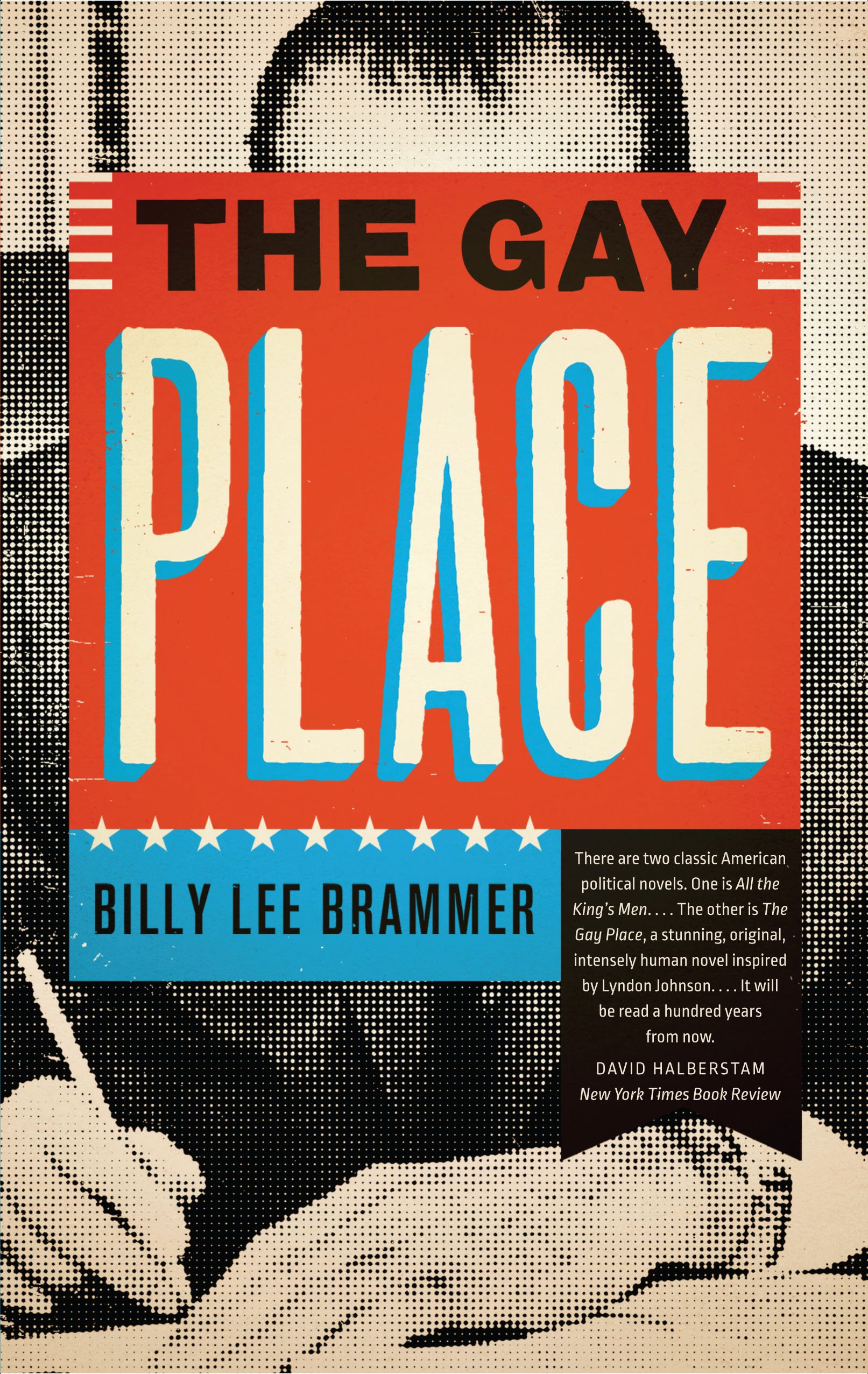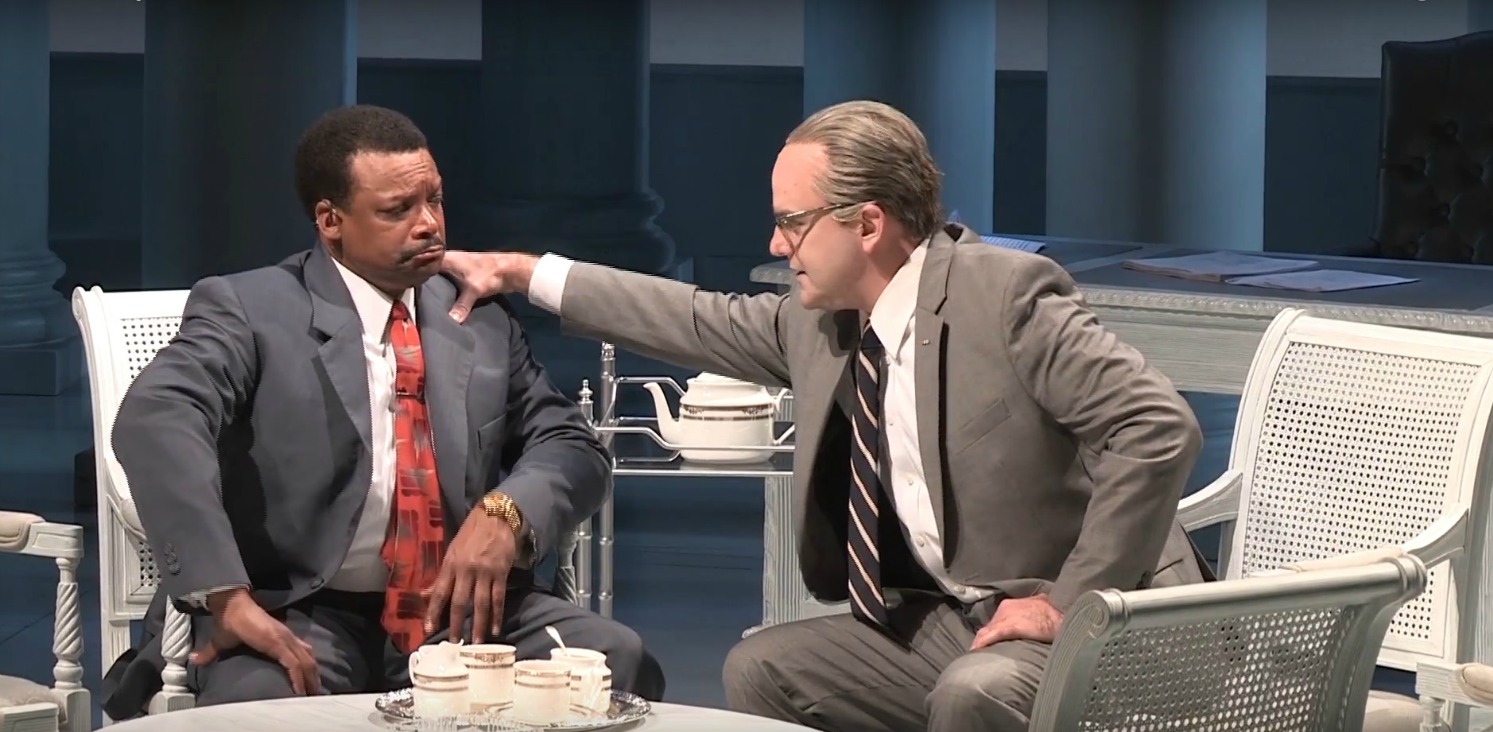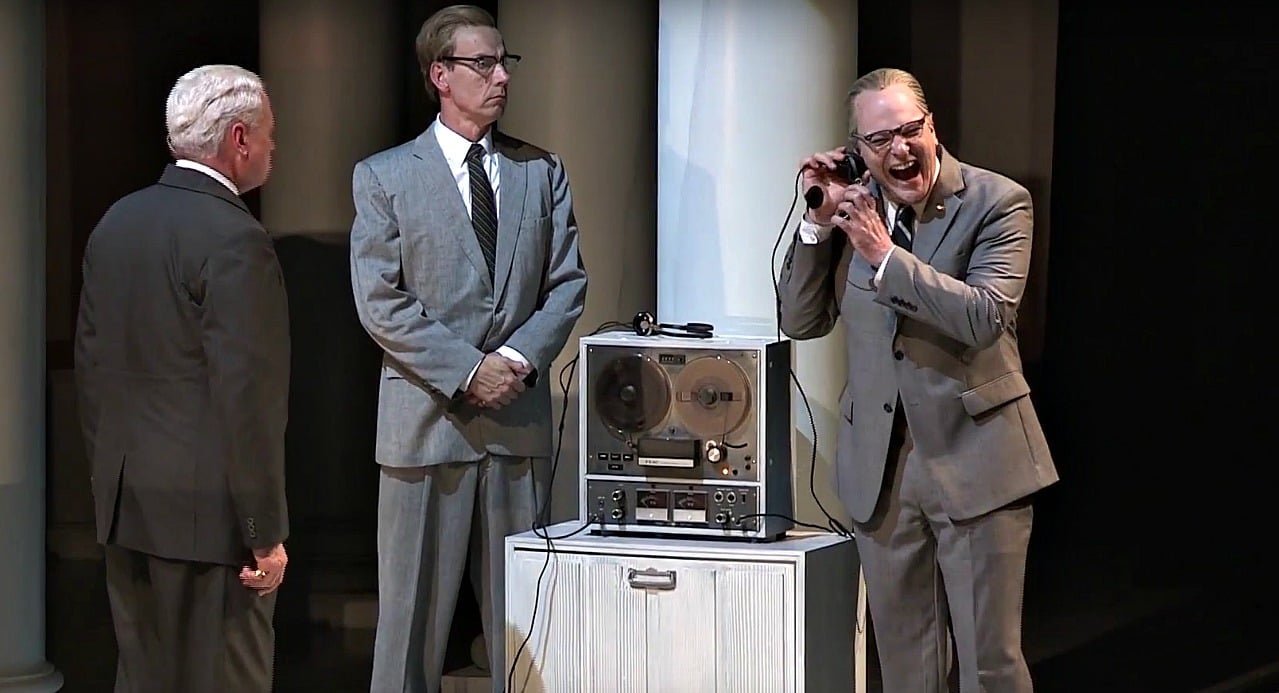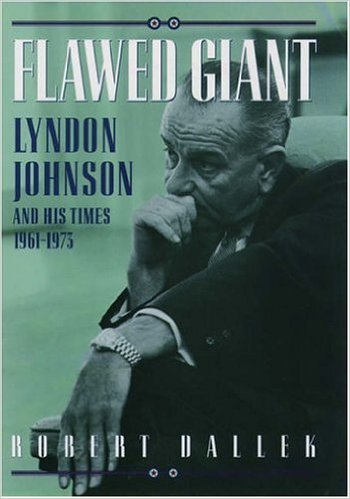Review: ‘All The Way’ At The Dallas Theater Center
ArtandSeek.net March 13, 2016 36‘All the Way,’ the Tony-winning drama about Lyndon Johnson, has naturally generated a lot of local interest at the Dallas Theater Center. But the divisive political and racial echoes from 1964 are also impossible to ignore. Art & Seek’s Jerome Weeks sat down with local All Things Considered host Justin Martin to talk about the show and its remarkable relevance.
Justin: I heard the Dallas Theater Center has already extended the run of the LBJ drama, ‘All the Way’ – in fact, they did it even before it opened.
Lots to write about.
Billy Lee Brammer’s novel, ‘The Gay Place,’ has remained, for years, perhaps the only fictional portrait of LBJ that managed to capture much of his outlandish, crude, sentimental, benevolent, wheeler-dealer nature. In the character of Governor Arthur Fenstemaker, LBJ is what elevates ‘The Gay Place’ into the realm of classic Texas novels and classic political novels.
 So a stage play that tries to take the measure of this man — and one that brings us the fullest theatrical portrait we’re likely to see — is worth getting off the couch for. Playwright Robert Shenkkan’s achievement was just corralling this much of Johnson into a play. True, he doesn’t include Johnson’s everyday country-boy manners. He’d often scratch his crotch in front of female reporters or, perhaps most infamously, conduct Oval Office business while seated on the toilet.
So a stage play that tries to take the measure of this man — and one that brings us the fullest theatrical portrait we’re likely to see — is worth getting off the couch for. Playwright Robert Shenkkan’s achievement was just corralling this much of Johnson into a play. True, he doesn’t include Johnson’s everyday country-boy manners. He’d often scratch his crotch in front of female reporters or, perhaps most infamously, conduct Oval Office business while seated on the toilet.
Yes, Lady Bird was indeed a long-suffering saint. Shenkkan does include a fair amount of Johnson’s ‘salty’ language and, what’s more important, his private cruelties, infidelities and political manipulations, even a passing mention of his Bobby Baker bribery scandal. For much of that profane language, those private conversations, the playwright had recourse to Michael Beschloss’ ‘Taking Charge: The Johnson White House Tapes 1963-1964′.
So as a stage character, Shenkkan’s Johnson manages to harangue and whine and bluster. We even get his back-tracking and arm-twisting over the attempt to break the all-white Mississippi delegation to the 1964 Democratic convention by seating black activists from the Mississippi Freedom Democratic Party. But Johnson also is clearly motivated by something grander than power or hubris: He fights the good fight for Civil Rights, however imperfectly and in however compromised or underhanded a fashion.
When it came to stoking local interest, it certainly helped that ‘All the Way’ won the Tony Award for best play and Bryan Cranston won a Tony for his performance as LBJ. But that certainly put more pressure on Brandon Potter, who plays LBJ here. Potter creates a compelling character, both driving and driven. Potter doesn’t deliver an impersonation. He doesn’t sound like LBJ, doesn’t look like him — he’s not old enough, not jowly enough — nor does he have the man’s physical gangliness or brute caginess. Potter’s too contained and restrained.
If all that’s true, why’d you find him ‘compelling’?
So how’s the rest of the show?
‘All the Way’ has seventeen actors playing multiple roles, so it’s as big as any Shakespeare drama. But it’s written like a dark, political thriller, like a movie. It’s fast-paced, with a lot of quick cuts, character changes and projections that Shenkkan wrote into the script (“Seven months to election”). So the play may unfold simply enough — it’s a clock-ticking chronology — but technically, it’s actually a fairly tricky show. Moriarty makes it work — and he does this without running off a photocopy of the Broadway show. This thing grabs hold.
But in your voice, I hear that note, that sound — ‘there’s more to the story.’
There’s all this backroom dealing and drama around LBJ – he’s trying to get his 1964 Civil Rights Bill past the diehard Southern segregationists. But the same kind of conflict rips at King, who’s holding the civil rights movement together with little more than his voice and his moral authority. The DTC production is almost literally a battle of voices. This is a talky play, but talky in a good way — ferocious arguments over leadership, over what is right, over which allies force your hand, over which allies must be betrayed to gain something.
“I’ve put all my credibility on the line telling our young people that this president can be trusted,” King yells in frustration at Senator Hubert Humphrey. “But to them, there’s no difference between Dirksen’s amendments and Bull Connor’s billy clubs. They want results. They are in Mississippi right now, putting their lives on the line — registering Negroes for a vote they still don’t have.”

Shawn Hamilton as Martin Luther King and Brandon Potter as Lyndon Johnson.
That’s Shawn Hamilton, who’s excellent as King; he manages to project a sense of authority without making King a plaster saint. He’s human — weary, angry, promiscuous — but also righteous and inspiring. It’s worth noting that, unlike Johnson’s private conversations, King’s actual words could not be used by Shenkkan. The King estate charges for that privilege and attaches conditions, so what you hear in ‘All the Way’ is Shenkkan imitating King, paraphrasing him..
So where does all this ‘battle of the voices’ lead to?
You’re saying, strictly speaking, the scene isn’t historically accurate.
But there’s also an equation here, one that Moriarty underscores by having Potter and Hamilton move together as they speak, trading lines like soloists in a band [the move together isn’t in the script — they’re kept in different parts of the stage, emphasizing King in Oslo, Johnson in New Orleans]. The portrait of the two having a tense but close working relationship is more historically accurate than the one conveyed in the otherwise excellent film ‘Selma.’ There, Johnson is depicted as resentful, even fundamentally antagonistic toward King and his mission.
But having them stand side-by-side delivering their speeches suggests a moral equivalency that troubles me. Johnson certainly risked a lot to push through his Civil Rights Bill. He alienated old friends, allies and mentors, like Senator Richard Russell of Mississippi, thus isolating himself to a degree both personally and politically. Friendships and shared allegiances are often what makes politics work.
As Johnson famously forecast, he also handed the South to the Republican Party for at least a generation, once Richard Nixon developed his ‘Southern strategy’ and wooed white racists into Republican ranks. Shenkkan makes the case that historians and biographers have: By forcibly and publicly working to break the back of America’s centuries-old apartheid, LBJ endangered his entire political future — and that of the Democratic party as well.
But risking your career to help overturn a great evil is one thing. Risking beatings, arrests, financial ruin, the murder of friends and associates, the bombing of your wife and children and, finally, a rifle bullet to the face — that’s a completely different order of sacrifice. Many Americans, particularly white liberals, have come to look back at the civil rights era with a nostalgic, benevolent glow; it’s a moment when many of us joined forces and did something truly worthwhile on a national scale for our fellow citizens, even if it was simply voting for the right leaders.

Listening to the FBI’s secret tapes of MLK’s love life. Kieran Connolly as J. Edgar Hoover, Chamblee Ferguson as an agent, Potter as Johnson.
And to a large extent, all that’s true. But in fighting that cause, African-Americans simply risked more, pushed more, struggled more, suffered more, had more at stake. Which means as much as this link between Johnson and King is meant to illustrate how much the two men needed each other, how they shared and worked together for many of the same goals, it can convey an easy, self-congratulatory sense of shared danger and sacrifice that’s just not true.
And while we’re on the subject of permissible or impermissible dramatic license —
— yes?
His eventual victory, of course, is a tremendous relief — a landslide. Johnson became not only the first Southerner elected president since Andrew Johnson, his was the most lopsided win in terms of popular votes (the biggest margin since James Madison in 1820) and the sixth most-lopsided in terms of electoral votes. It was a rout.
But this was forecast, going into the conventions. In ‘Flawed Giant,’ the second volume of his biography of Johnson, Robert Dallek reports that Johnson entered the race with a favorable rating in the high sixty even seventy percent range. He could lose seven points and it wouldn’t make a dent in his victory.

But again, I’d argue that Shenkkan’s close-call election is understandable — and it’s more than an attempt just to give his lengthy drama some extra dramatic tension toward the end. It’s psychologically accurate. This is how the needy, Johnson saw himself: embattled, out on a limb, alone. To him, nothing less than a complete affirmation of his administration was a failure.
So Shenkkan dramatizes what Dallek reports: Even in the last days, when it was clear to any impartial observer that his win was in the bag, Johnson was marshaling resources and throwing in more money. To this day, Johnson’s campaign is a classic case of overkill. The infamous “daisy attack ad” wasn’t really necessary (and was aired only once by the campaign). Not only had Goldwater’s policies split the Republican party and driven independents into the Democratic fold, he continued to make unrepentant, outrageous remarks — a case of wanting to be right more than wanting to win.
Enough about Johnson and King. The real surprise in the DTC production isn’t the ’64 elections, it’s how close Adam Anderson comes to stealing the show as Stokely Carmichael. Carmichael was one of the leaders of SNCC, the Student Nonviolent Coordinating Commitee; he’s the more outspoken, more extreme civil rights leader onstage. He’s actually a minor character, an irritating trouble-maker for King, but Anderson conveys Carmichael’s charisma and wounded rage. Carmichael appears in only a couple scenes, but he’s riveting and, to a degree, heartbreaking.
How so?
So when Carmichael is outraged by the murder of three civil rights workers in Mississippi and starts shouting ‘Stand up! Stand up!’ you can’t help but fear it’s been 60 years since that moment, and we’re still battling over voting rights and shooting deaths. That’s why this play is both thrilling and heart-breaking.
But you know what else Shenkkan couldn’t have foreseen?
What?
So the play makes ‘history come alive.’
So what do you see coming on the horizon?
Thanks, Jerome










